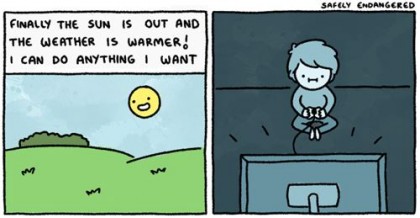Social Media and the Crocodile in the Bedroom
Devra Torres | May 21, 2013

One of my favorite books is Fables, by the delightful Arnold Lobel. (If you have children, don’t miss his “Frog and Toad” series.) One chapter is called “The Crocodile in the Bedroom.”

It goes like this (bear with me--the personalist angle will become evident shortly):
A Crocodile became increasingly fond of the wallpaper in his bedroom. He stared at it for hours and hours.
"Just look at all those neat and tidy rows of flowers and leaves, " said the Crocodile. "They are like soldiers. There is not a single one that is out of place."
"My dear," said the Crocodile's wife, "you are spending too much time in bed. Come out into my garden where the air is fresh and the sun is bright and warm."
"Well, if you insist, for just a few minutes," said the Crocodile. He put on a pair of dark glasses to protect his eyes from the glare and went outside.
Mrs. Crocodile was proud of her garden.
"Look at the hollyhocks and the marigolds," she said. "Smell the roses and the lilies of the valley."

"Great heavens!" cried the Crocodile. "The flowers and leaves in this garden are growing in a terrible tangle! They are all scattered! They are messy and entwined!"
The Crocodile rushed back to his bedroom in a state of great distress. He was at once comforted by the sight of his wallpaper.
"Ah," said the Crocodile. "Here is a garden that is ever so much better. How happy and secure these flowers make me feel!"
After that the Crocodile seldom left his bed. He lay there, smiling at the walls. He turned a very pale and sickly shade of green.
Without a doubt, there is such a thing as too much order.
* * * * *
I was reminded of the Crocodile by a picture I saw on facebook the other day (hat tip to Kevin and Bridget Galbraith):

See the pale and sickly shade of green? What is it exactly that makes the internet, and especially social media, so appealing as to trump any other option?
Is it the unprecedented power to go anywhere, learn anything, see and hear anything at will? In theory, that seems like the most attractive and mindboggling element, but I doubt that it’s what really draws most of us. I think it’s less a thirst for knowledge than a thirst for escapism, and the call of various addictions.
Is it the sheer effortlessness of it all? Of course, it’s partly that—but what strikes me most is something else.
I think it’s the control, the “too much order.” When it comes to interaction among persons, social media gives me power to deal with only that version of myself, and of other people, that I choose to construct.
I can instantly:
- make my presence known (be “visible”)
- vanish (become “invisible”)
- prevent (block) someone from contacting me at all
- manage people’s ability to contact me, curtailing or enlarging it at my pleasure (designate them “close friends,” “acquaintances” or people who only rate my notice in case of “important updates”)
- delete or improve (photoshop) unflattering images of myself
- Modify (edit) something I’ve already said.
These, of course, are abilities that would come in handy in non-virtual reality. The more we wield such powers in cyberspace, the more we feel them to be normal, the “default settings” of life.
But what if we really had the power to impose that kind of “order”? Bumping up against other human beings, especially those who don’t prove pliable, is an irreplaceable experience, and not one we would necessarily seek out if left to ourselves. Marriages, friendships, parenthood, and even dealings with God run into trouble when the other party fails to conform to our image of them. But it’s a fruitful kind of trouble: it’s the price of living in the truth.
It’s the kind of thing Pope Francis is talking about when he implores the Church not to be stagnant and “self-referential.”

“A Church that does not go out of itself, sooner or later, sickens from the stale air of closed rooms,” he points out. Going out into the world and meeting people as you find them 
can cause “accidents.” “Life can get complicated. But,” he insists, “I prefer a thousand times a Church of accidents to a sick Church.”
We can sidestep such complications by deforming personal relationships, as when one person ties himself in knots to appear to match up with what another expects or prefers. Or we can avoid real-world interpersonal entanglements altogether. To paraphrase Milton’s Satan, sometimes we would rather reign in virtual reality than serve in real life.
This is no brief for ludditism. Social media is no more intrinsically evil than wallpaper is, and of course it can be used to create and enrich genuine personal interactions.
But the symptoms of Crocodile Syndrome can be subtle. It's just as well to check your skin tone and your ability to enjoy life's messy and entwined pleasures now and then.
